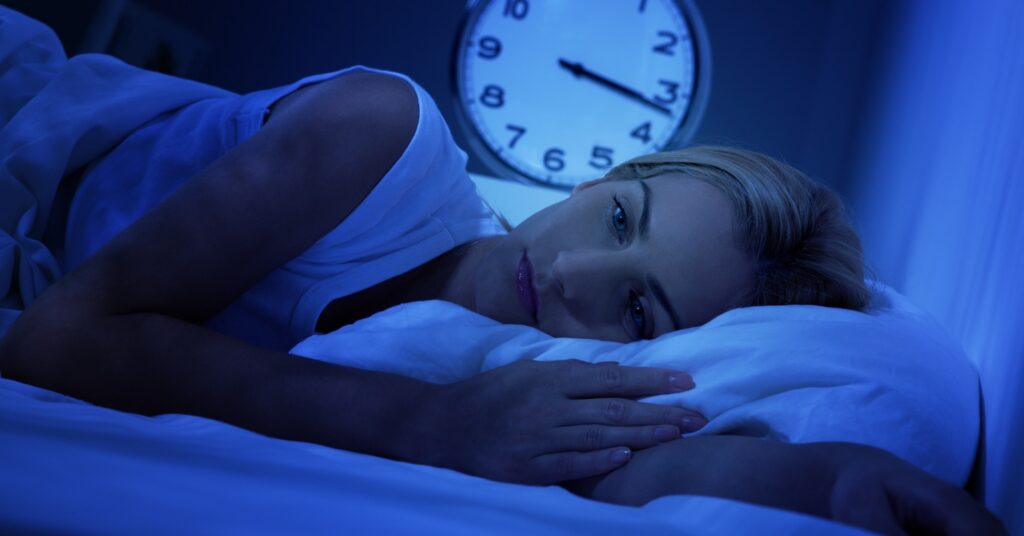Dr Geraldine Borman
Did you know that sleep and pain are related? You may think, “Of course pain will keep me awake at night, that’s obvious”. But what you don’t realise is that the relationship is bidirectional. This means that if you suffer from pain and you have poor sleep, your pain will get worse! Poor sleep has been linked to increased pain sensitivity and to new-onset pain. Therefore, improving your quality of sleep can lead to an improvement of your pain.

Sleep is a state of rest where your body is not active, and you are unconscious. It has different stages (Stage 1-4 and REM) that you cycle through as the night progresses. Some stages are light sleep while others are deeper, and REM sleep is usually when you have vivid dreams. To feel well rested you need to cycle through all these stages multiple times throughout the night.
Sleep is important for both your brain and your body to recover and perform important maintenance tasks. If you lack sleep it may lead to low mood, irritability, slow responses, poor memory and concentration, problems in your relationships, as well as increase your risk for certain medical conditions like obesity, depression, anxiety, heart disease and diabetes.
The average adult needs at least 7 hours of sleep every night. It is normal for everyone to experience some sleepless nights now and then- just a few days or weeks. This can happen when you are feeling sick, or when you are very anxious or even excited about something. There are some medical conditions that can lead to chronically poor sleep, e.g. sleep apnoea, restless leg syndrome, depression, and anxiety.
When you persistently struggle to sleep (for months) it is called Insomnia. It is very important to get a health check-up from your doctor to find the underlying cause of your insomnia. You can also practice sleep hygiene – these are things you should do daily to ensure a good night’s sleep. Sometimes your doctor may prescribe some sleeping tablets, but these are supposed to be used only for 2-4 weeks while the underlying cause of your sleeplessness is treated.
Sleep hygiene habits to improve your quality of sleep:
- Keep to a sleep schedule: It is important to get up at the same time every morning, and to go to sleep at the same time every night. Even continue your schedule on weekends and holidays.
- Have a relaxing routine before bed – this can include a hot shower/bath, meditation, reading a book, listening to calm music, light stretching.
- Maintain a cool temperature in your room (18-21 degrees).
- Make sure your room is dark and quiet.
- Avoid caffeine after midday.
- Avoid nicotine and alcohol prior to bedtime.
- Avoid drinking beverages before bed so you do not have to get up to urinate during the night.
- Have an early light dinner to avoid indigestion interfering with your sleep. Also avoid spicy and deep-fried foods as they can cause indigestion.
- Limit daytime naps to 30min-1 hour and do not nap after 3pm.
- Get 30 minutes of natural sunlight during the day.
- If you cannot fall asleep in 10-20 min, get up and sit in a dark quiet room. Let your thoughts wander until you are sleepy and then go back to bed.
- Avoid screens (phone, TV, laptop) for at least 1 hour before bedtime – the stimulation and lighting from the screens will keep your mind racing and interfere with melatonin production.
- Only use the bed for sleeping and sex – no eating, scrolling on your phone, watching TV, etc. while in bed. This trains your brain to associate your bed with sleep and will assist you to sleep better.
- Get some exercise – In the long term, exercise is a great way to feel more energetic during the day and sleep better at night. Exercise releases cortisol which can keep you awake, so remember to avoid exercise 3 hours before bedtime so that it does not keep you up.
Key points to remember:
- Medication forms only a small part of pain management. Pain management requires a healthy lifestyle to ensure mental, physical, spiritual and social wellbeing.
- Improving your sleep quality can reduce your pain.
- By practising sleep hygiene you can drastically improve your quality of sleep.

